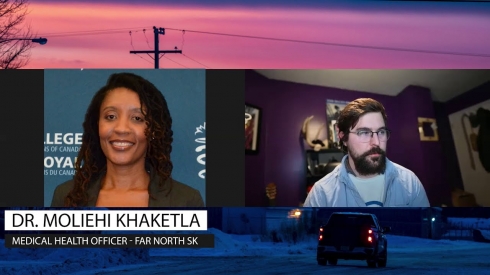- Start playing the video
- Click CC at bottom right
- Click the gear icon to its right
- Click Subtitles/CC
- Click Auto-translate
- Select language you want
EcoFilm Livestream - Lessons in Peat Mining from Mb
The northern Saskatchewan tri-communities advocacy group known as For Peat Sake are excited to bring you the second event in their speaker's series. Peat mining is an important issue in Northern Saskatchewan. You can see a previous livestream about the issue here.
In partnership with Water Docs [here represented by Suzanne Christie], we bring you the community screening of the film, "For Our Peats Sake" which documents the fight to protect the Winnipeg watershed region wetlands. Following the film join us for discussion and Q&A with special guests, film director Thayer MacKinnis from Peatland Collective and Eric Reder with Manitoba Wilderness Committee.
About Water Docs: a division of Ecologos—which has been delivering environmental education and action programs since 1999. Its founder, Stan Gibson, said this of the Organization “We (Water Docs) dedicate ourselves to protecting water, using documentary storytelling and experimental learning to revive a stense of reverence, address threads and stir action.”
About the film: FOR OUR PEAT'S SAKE is an examination of the economic benefits and ecological impacts that are incurred through the production and use of ancient reserves of peat mosses. The 35 minute documentary film focuses on the Lake Winnipeg watershed region, where desperate Canadians and First Nations peoples are fighting for the protection of water, as nutrient runoff, flooding, and extreme weather has resulted in suffocating lakes and toxically undermined water sources.
Mature peatland ecosystems stand as an integral balancing force in the face of climate change, sequestering more carbon than all of the world's forests combined and reinforcing the resiliency of the water-tables across vast regions. Peat plays a critical role in maintaining the ecological equilibrium upon which we all depend.
Jobs and economic growth are the returns of the peat mining industry. FOR OUR PEAT'S SAKE investigates what it really means to accept peat mining within a threatened local watershed and globally undermined atmosphere.
Top scientists in geography, hydrology, and biology, as well as traditional users of the land, politicians, and environmental advocates, explain the true costs and returns of peat mining as well as the misleading rhetoric that blurs consumers’ and policy makers’ perspectives alike.
About our Panel:
Eric Reder has been a campaigner with the Wilderness Committee for 15 years, acting as a watchdog for wild spaces, wild species and healthy communities around Manitoba and beyond. Eric works from Treaty One Territory, Homeland of the Métis Nation. His work has focussed on ending industrial logging and mining in provincial parks, protecting peatlands, climate action and fossil fuel development, and boreal woodland caribou.
He is an avid and accomplished outdoorsman. Eric spent his youth exploring in the wilderness east of Lake Winnipeg, starting with his first paddling trip at the age of four. Since then he’s journeyed through much of Canada’s wildlands and many US wilderness areas as well. He is raising the next generation of outdoorfolk in his son, North.
Add new comment
Missinipi Broadcasting Corporation’s beginnings go back to the early 1980’s. Prior to that, the north had received merely token attention in the area of communications.
Today MBC is heard in well over 70 communities, including many southern cities where thousands of ‘Urban Aboriginals’ now make their homes but still wish to keep informed of what is going on in the north. MBC’s Cree and Dene programming is nationally recognized as leading the field in indigenous communications, and has been shared with audiences as far away as the Northwest Territories, Alberta, BC, and Ontario.





We encourage comments which further the dialogue about the stories we post. Comments will be moderated and posted if they follow these guidelines:
The Community Media Portal reserves the right to reject any comments which do not adhere to these minimum standards.